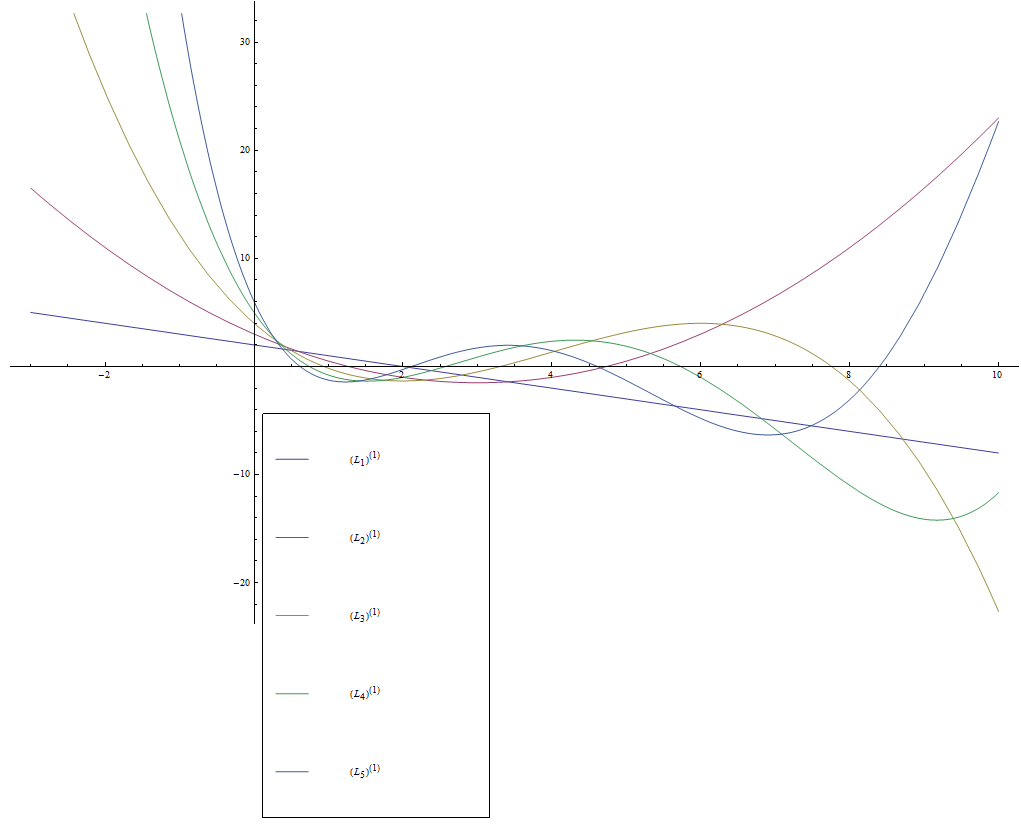Difference between revisions of "Associated Laguerre L"
From specialfunctionswiki
(Created page with "Let $\alpha \in \mathbb{R}$. The associated Laguerre polynomials, $L_n^{(\alpha)}(x)$ are solutions of the differential equation $$x\dfrac{d^2y}{dx^2} + (1-x)\dfrac{dy}{dx} +...") |
|||
| (13 intermediate revisions by the same user not shown) | |||
| Line 1: | Line 1: | ||
| − | Let $\ | + | __NOTOC__ |
| − | $$x\dfrac{d^2y}{dx^2} + (1-x)\dfrac{dy}{dx} + ny=0.$$ | + | Let $\lambda \in \mathbb{R}$. The associated Laguerre polynomials, $L_n^{(\lambda)}(x)$ are solutions of the differential equation |
| + | $$x\dfrac{d^2y}{dx^2} + (\lambda+1-x)\dfrac{dy}{dx} + ny=0.$$ | ||
The first few Laguerre polynomials are given by | The first few Laguerre polynomials are given by | ||
$$\begin{array}{ll} | $$\begin{array}{ll} | ||
| − | L_0^{(\ | + | L_0^{(\lambda)}(x) &= 1 \\ |
| − | L_1^{(\ | + | L_1^{(\lambda)}(x) &= -x+\lambda+1 \\ |
| − | L_2^{(\ | + | L_2^{(\lambda)}(x) &= \dfrac{x^2}{2} -(\lambda+2)x+\dfrac{(\lambda+2)(\lambda+1)}{2} \\ |
| − | L_3^{(\ | + | L_3^{(\lambda)}(x) &= -\dfrac{x^3}{6} + \dfrac{(\lambda+3)x^2}{2} - \dfrac{(\lambda+2)(\lambda+3)x}{2} + \dfrac{(\lambda+1)(\lambda+2)(\lambda+3)}{6} \\ |
\vdots | \vdots | ||
\end{array}$$ | \end{array}$$ | ||
| + | |||
| + | <div align="center"> | ||
| + | <gallery> | ||
| + | File:Associatedlaguerrealpha=1.png|Graph of $L_n^{(1)}$ on $[-2,10]$. | ||
| + | </gallery> | ||
| + | </div> | ||
| + | |||
=Properties= | =Properties= | ||
| − | + | ||
| − | < | + | =See also= |
| − | + | [[Laguerre L]]<br /> | |
| − | + | ||
| − | + | =References= | |
| − | + | ||
| − | + | {{:Orthogonal polynomials footer}} | |
| + | |||
| + | [[Category:SpecialFunction]] | ||
Latest revision as of 13:38, 15 March 2018
Let $\lambda \in \mathbb{R}$. The associated Laguerre polynomials, $L_n^{(\lambda)}(x)$ are solutions of the differential equation $$x\dfrac{d^2y}{dx^2} + (\lambda+1-x)\dfrac{dy}{dx} + ny=0.$$
The first few Laguerre polynomials are given by $$\begin{array}{ll} L_0^{(\lambda)}(x) &= 1 \\ L_1^{(\lambda)}(x) &= -x+\lambda+1 \\ L_2^{(\lambda)}(x) &= \dfrac{x^2}{2} -(\lambda+2)x+\dfrac{(\lambda+2)(\lambda+1)}{2} \\ L_3^{(\lambda)}(x) &= -\dfrac{x^3}{6} + \dfrac{(\lambda+3)x^2}{2} - \dfrac{(\lambda+2)(\lambda+3)x}{2} + \dfrac{(\lambda+1)(\lambda+2)(\lambda+3)}{6} \\ \vdots \end{array}$$
